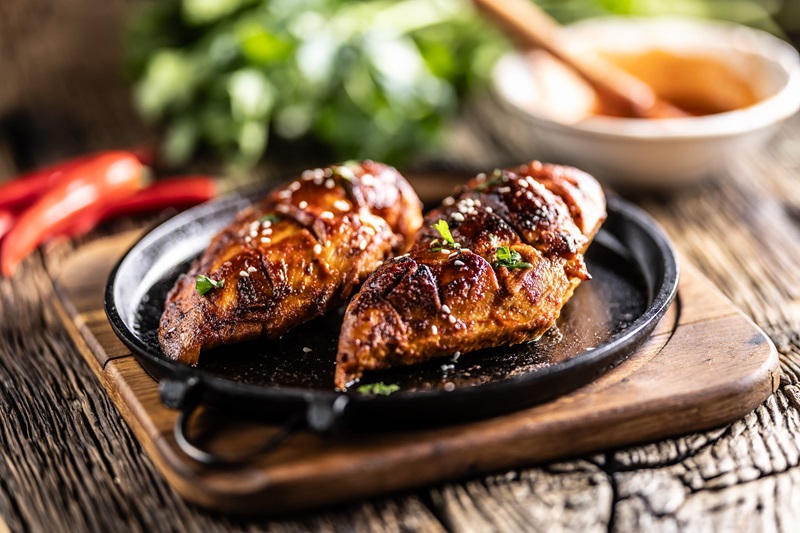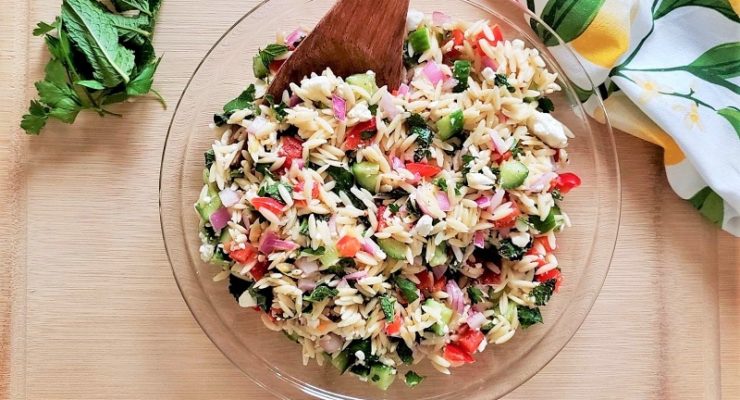
Korean BBQ chicken, a dish celebrated for its succulent flavors and aromatic spices, is a tasty treasure that has transcended its traditional roots to become a global sensation. This dish, known for its unique blend of sweet, savory and spicy tastes, is not only delicious but also offers a range of health benefits that make it a worthy addition to any diet.
As we delve into the world of healthy Korean BBQ chicken, we uncover how this beloved dish can be a delightful way to enjoy the richness of Korean cuisine while embracing a balanced and nutritious lifestyle.
Korean BBQ chicken is traditionally marinated in a concoction of soy sauce, garlic, ginger and a variety of fruits like pear or apple, which impart a depth of flavor and tenderize the meat, making it irresistibly juicy and flavorful. The marinade often includes gochujang (Korean chili paste) or doenjang (Korean soybean paste), which are key to its distinctive taste and packed with probiotics, vitamins and minerals.
By grilling the chicken, we maximize its taste while minimizing the need for additional fats. This makes it a healthier choice compared to other cooking methods that may require heavy oils.
In this recipe, we will explore how to prepare a healthier version of Korean BBQ chicken that maintains the authentic flavors of this classic dish. We will also incorporate tweaks that cater to a health-conscious audience.
From selecting the right cuts of chicken to incorporating wholesome, nutrient-rich ingredients in the marinade, we’ll guide you through each step to ensure your Korean BBQ chicken is both mouthwateringly delicious and healthy
How to Make Korean BBQ Chicken
Creating a delectable Korean BBQ Chicken dish is a journey into the heart of Korean cuisine, promising not just a meal but an experience rich in flavor and tradition. This particular recipe serves four, making it a perfect centerpiece for a family dinner or a small gathering of friends, with each serving containing 224 calories. For those on Nutrisystem, this dish can be logged as two PowerFuels and two Extras in your NuMi app journal.
Ingredients for Flavor and Nutrition
The ingredients are simple yet potent in their ability to transform chicken into a culinary masterpiece. You’ll need one-fourth cup of low-sodium soy sauce, one-fourth cup of chopped onion, two tablespoons of honey, and one tablespoon each of gochujang (Korean chili paste), minced garlic, sesame oil and rice vinegar.
The marinade is rounded off with two teaspoons of grated ginger and a one-fourth teaspoon of black pepper for that extra kick. The star of the show, one pound of thinly sliced chicken, becomes the canvas for these vibrant flavors.
Marinating the Chicken
The magic begins by whisking together the soy sauce, onion, honey, gochujang, garlic, sesame oil, ginger, black pepper and rice vinegar. This mixture creates a marinade that’s both complex and harmonious, with each ingredient playing a role in tenderizing and infusing the chicken with deep, robust flavors.
Once the marinade is ready, the chicken is added, ensuring each piece is thoroughly coated. Cover and let this marinate in the refrigerator for anywhere between two to eight hours, allowing the flavors to meld and penetrate the chicken, making it tender and flavorful.
Cooking to Perfection
When it’s time to cook, the chicken is transferred to a cast-iron skillet or grill, cooked for four to five minutes per side until perfectly done. The cooking method not only imparts a smoky char that’s characteristic of BBQ but also locks in the moisture, ensuring every bite is succulent and delicious. After cooking, the chicken is set aside, waiting to be dressed in its final glory.
The Final Touch: Sauce Preparation
The remaining step involves taking the reserved marinade, transferring it to a skillet or small saucepan, and bringing it to a boil. This step concentrates the flavors and thickens the sauce, creating a rich, glossy glaze that’s poured over the cooked chicken. The result is a dish that’s visually appealing and bursting with the sweet, savory and slightly spicy flavors that define Korean BBQ Chicken.
This Korean BBQ Chicken recipe is more than just a meal; it’s a celebration of flavors and a nod to the balance of nutrition and taste. Whether you’re cooking for health, pleasure or a bit of both, this dish promises to deliver on all fronts, leaving you and your guests craving for more.
Complementing the Chicken: Sides and Pairings
To fully appreciate the depth and complexity of Korean BBQ Chicken, pairing it with the right side dishes can transform a simple meal into a feast for the senses. Each side dish complements the flavors of the chicken and brings its own unique taste and texture to the table, creating a harmonious dining experience.
Kimchi: A Staple of Korean Cuisine
Kimchi, the quintessential Korean side dish, is a must-have for any Korean meal. This spicy and tangy fermented cabbage is not just a burst of flavor but also a powerhouse of probiotics, vitamins and minerals. Its crisp texture and deep flavors of chili, garlic and fish sauce make it the perfect counterbalance to the savory sweetness of the BBQ chicken. The fermentation process adds a complexity that enhances the overall flavor profile of your meal, providing a refreshing contrast with each bite.
Cucumber Salad: Crisp and Refreshing
A simple cucumber salad, often seasoned with vinegar, sugar and a hint of chili flakes, offers a light and refreshing touch to the meal. The crispness of the cucumber slices, combined with the tangy dressing, helps cleanse the palate between bites of rich BBQ chicken. This salad is not only a delight in terms of texture but also adds a visually appealing element with its vibrant green color, making it a refreshing counterpart to the meal’s heavier flavors.
Steamed Rice: The Perfect Canvas
A bowl of steamed, fluffy rice acts as the perfect canvas for the Korean BBQ Chicken. The subtle, slightly sticky grains absorb the rich, spicy sauce of the chicken, allowing for a perfect blend of flavors in every spoonful. Rice provides a comforting, neutral base that balances the intensity of the marinade, ensuring that the meal remains satisfying without overwhelming the palate.
Japchae: Sweet and Savory Noodles
Japchae, a beloved Korean dish of stir-fried glass noodles with a variety of vegetables (such as spinach, carrots and mushrooms), offers a delightful interplay of textures and flavors. The noodles, made from sweet potato starch, have a unique, chewy texture that pairs beautifully with the tender, flavorful chicken. Seasoned with soy sauce, sesame oil and a hint of sugar, japchae adds a sweet and savory element to the meal, making it more substantial and satisfying.
Green Salad with Sesame Oil Vinaigrette: Light and Crisp
To balance out the rich flavors of the BBQ chicken, consider serving a simple green salad dressed with a sesame oil vinaigrette. The light, crisp greens, whether it’s a mix of lettuce, spinach or arugula, dressed in a vinaigrette made with sesame oil, rice vinegar and a touch of honey, adds a bright and aromatic touch to your meal. This salad provides a refreshing crunch and introduces a nutty flavor from the sesame oil, which complements the Korean BBQ Chicken beautifully.
By carefully selecting side dishes that offer a range of textures, flavors and nutritional benefits, you can create a well-rounded meal that celebrates the rich and diverse palette of Korean cuisine. Check out the Nutrisystem Grocery Guide for information on counting add-ins, and explore the Leaf for more delicious side dish recipes!
Servings: 4
Calories per Serving: 224
On Nutrisystem, Count As: 2 PowerFuels and 2 Extras
Ingredients:
- ¼ cup soy sauce, low sodium
- ¼ cup chopped onion
- 2 Tbsp. honey
- 1 Tbsp. gochujang
- 1 Tbsp. minced garlic
- 1 Tbsp. sesame oil
- 2 tsp. grated ginger
- ¼ tsp. black pepper
- 1 Tbsp. rice vinegar
- 1 lb. thinly sliced chicken
Directions:
- Whisk together soy sauce, onion, honey, gochujang, garlic, sesame oil, ginger, black pepper and rice vinegar.
- Add the chicken to the marinade and toss to coat. Cover and refrigerate for 2-8 hours.
- Cook chicken in a cast-iron skillet or grill for 4-5 minutes per side, or until fully cooked. Remove and set aside.
- Reserve the marinade and transfer to skillet or small saucepan. Bring to a boil over medium-high heat and cook until slightly thickened, about 2-3 minutes.
- Pour the cooked sauce over the cooked chicken and serve.






